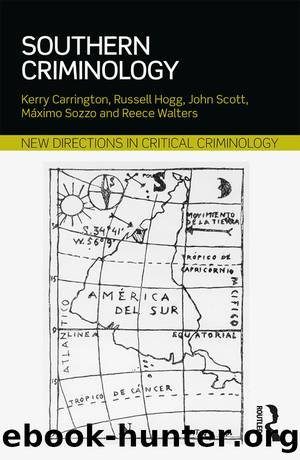Southern Criminology by unknow

Author:unknow
Language: eng
Format: epub
Tags: Social Science, Criminology
ISBN: 9781138721296
Google: YUNvDwAAQBAJ
Barnesnoble:
Goodreads: 41417032
Publisher: Routledge
Published: 2018-09-18T00:00:00+00:00
Penality beyond national borders: looking out from âincarcerativeâ to âexcarcerativeâ modes of punishment (De Vito and Lichtenstein 2015: xiv)
I was perplexed. How were Empire and penal colonies so absent from the penological canon? How would the historical sociology of punishment look if we gazed outwards towardsâor even first opened our eyes beyondâEurope and North America?
(Anderson 2016: n.p.)
The penal modernist narrative elaborated within the revisionist sociology of punishment that has flourished since the 1970s is dominated by the image of punishment as confinement: a linear historical movement in which the pre-modern age of political absolutism, bodily punishment, torture, and forced labour gave way to liberal political institutions, scientific reason, national progress, and the disciplinary prison. The narrative rests on further core assumptions. The most fundamental of these is the idea that the nation state is the natural and obvious unit within which to frame analyses of penality. Penal policy is to be understood as an instrument of states directed at their internal governance. Modern penal development has been analysed almost exclusively by reference to the trajectory of the nation state (or sometimes, in federal systems of government, sub-state jurisdictions); that is, as a phenomenon occurring within national borders driven by the domestic politics, economics, and culture of the liberal state. Cross border influences are, of course, acknowledged. In the global era, such influences are increasingly subject to examination, prompting researchers to consider issues like: âpolicy transferâ (how penal policy âtravelsâ); the âdiffusionâ of penal ideas; and the impact of particular national political contexts on the reception of ideas (see for example, Newburn 2010 and the series of studies in the edited collection Newburn and Sparks 2004). Nevertheless, the core processes in question are often regarded as being internal to the state.
In addition, such inquiries tend to be set against a further, rather insistent and fundamental underlying assumption: that just as the North Atlantic societies led the way in shaping the modern world, the penal forms pioneered in these societies (especially the prison) naturally make their way across the globe as other societies are led to emulate the penal precedent set by them. This has created the basis for a rapidly developing contemporary comparative penology in which imprisonment rates are used as a tool for cross-national comparison of penal systems, for judging their relative punitiveness and so on (two of the best-known examples are Cavadino and Dignan 2006 and Lacey 2008).
One consequence of this North Atlantic, state-centric bias is that close to no attention has been given to the ways in which modern penality has been shaped by âhistorical processes and relationships that transcend nation states and that connect apparently separate worldsâ (Curthoys and Lake 2005: 5). Viewing penality from the South necessitates recognition that certain formative processes shaping modern penality transcended national borders, rendering the tendency to focus exclusively on national and endogenous drivers of penal development partial and misleading.
As Clare Andersonâs quote at the beginning of this section makes clear, penality was deeply implicated in the European colonisation of ânew worldsâ in the early modern and modern periods.
Download
This site does not store any files on its server. We only index and link to content provided by other sites. Please contact the content providers to delete copyright contents if any and email us, we'll remove relevant links or contents immediately.
Cecilia; Or, Memoirs of an Heiress — Volume 1 by Fanny Burney(32536)
Cecilia; Or, Memoirs of an Heiress — Volume 2 by Fanny Burney(31934)
Cecilia; Or, Memoirs of an Heiress — Volume 3 by Fanny Burney(31925)
The Great Music City by Andrea Baker(31911)
We're Going to Need More Wine by Gabrielle Union(19030)
All the Missing Girls by Megan Miranda(15921)
Pimp by Iceberg Slim(14476)
Bombshells: Glamour Girls of a Lifetime by Sullivan Steve(14046)
For the Love of Europe by Rick Steves(13853)
Talking to Strangers by Malcolm Gladwell(13339)
Norse Mythology by Gaiman Neil(13331)
Fifty Shades Freed by E L James(13227)
Mindhunter: Inside the FBI's Elite Serial Crime Unit by John E. Douglas & Mark Olshaker(9312)
Crazy Rich Asians by Kevin Kwan(9271)
The Lost Art of Listening by Michael P. Nichols(7485)
Enlightenment Now: The Case for Reason, Science, Humanism, and Progress by Steven Pinker(7303)
The Four Agreements by Don Miguel Ruiz(6739)
Bad Blood by John Carreyrou(6608)
Weapons of Math Destruction by Cathy O'Neil(6260)
